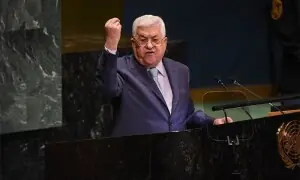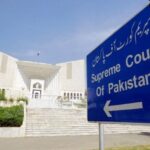WASHINGTON: Pakistan joined an overwhelming majority at the United Nations General Assembly on Friday, supporting a resolution that grants the State of Palestine greater participation rights during the Assembly’s 80th session.
The resolution was adopted with 145 votes in favour, five against — including the United States and Israel — and six abstentions.
Four of the five permanent members of the UN Security Council — Britain, China, France, and Russia — supported the resolution. Several close US allies, including Germany, Belgium, and Saudi Arabia, also voted in favour.
The move followed Washington’s decision to deny or revoke visas for Palestinian Authority President Mahmoud Abbas and nearly 80 other senior officials, blocking them from attending the UNGA in New York. However, Palestine will be represented in the chamber by its UN ambassador.
Palestinian Authority President Mahmoud Abbas to address via video link; nearly dozen states expected to recognise Palestinian state next week
In response, the UNGA voted to allow President Abbas to address next week’s high-level meeting by video link.
Defending the decision, the US State Department said: “It is in our national security interests to impose consequences and hold the PLO and PA accountable for not complying with their commitments and undermining the prospects for peace.”
The Palestinian presidency sharply criticised the measure, saying it was “astonished by the visa decision, which contradicts international law, specifically the Headquarters Agreement between the United Nations and the United States, which prohibits preventing any delegation from access.”
The resolution ensures Palestine’s “meaningful participation” by allowing its president or senior representatives to deliver pre-recorded statements during the general debate, high-level conferences, and other UN meetings.
Saudi Arabia and France will co-chair meetings from Monday on the Israeli and Palestinian two-state solution, which aims to see both sides existing alongside one another in peace.
About 10 countries, including France, Australia, Belgium, Britain and Canada are expected to formally recognise an independent Palestinian, after the overwhelming adoption last week by the General Assembly of a text supporting a future Palestinian state – albeit without Hamas.
The countries say these moves are intended to put pressure on Israel to end its devastating assault on Gaza, curtail the building of new Jewish settlements in the occupied West Bank and recommit to a peace process with the Palestinians.
But the countries planning to recognise a Palestinian state have not said what difference that would make to their diplomatic representation.
French President Emmanuel Macron, the first leader of a major Western power to endorse recognition, said the move would be accompanied by a commitment by the PA to enact reforms, which would improve Palestinian governance and make it a more credible partner for the post-war administration of Gaza.
All eyes will be on US President Donald Trump who has initiated massive cuts to US foreign aid since his return to the White House, hammering UN agencies as humanitarian needs grow.
Israel’s main ally has long said it will recognise a Palestinian state, but only after the Palestinians agree with Israel on a “two-state solution”.
Syria’s President Ahmed al-Sharaa will be a prominent new addition to the gathering, which also includes Ukrainian President Volodymyr Zelensky, Brazil’s Luiz Inacio Lula da Silva and Iranian President Masoud Pezeshkian.
On Wednesday, UN chief Antonio Guterres and Brazil’s Lula will organise a climate summit on Wednesday where some states may announce new goals to reduce greenhouse gas emissions, just weeks ahead of COP30 in Brazil.
With input from AFP, Reuters
Published in Brackly News, September 20th, 2025
Discover more from Brackly News
Subscribe to get the latest posts sent to your email.



